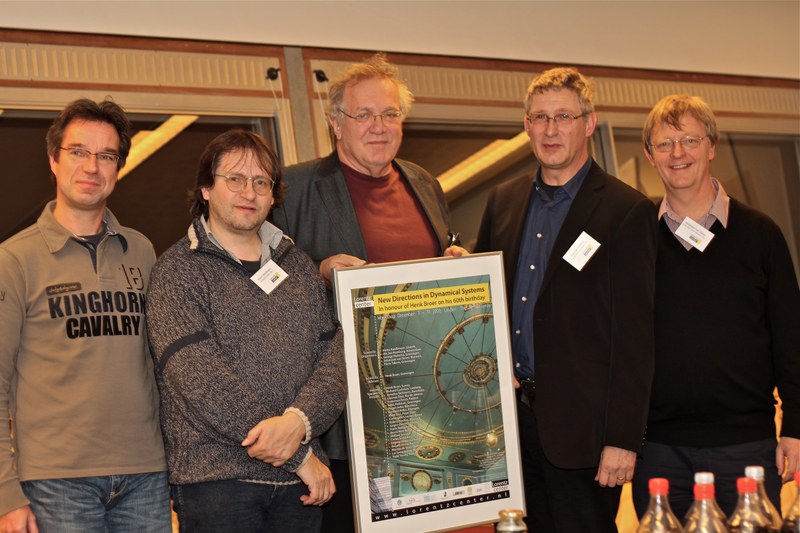New directions in Dynamical Systems
December 7 - 11, 2009
Scientific coordinators:
Heinz Hanßmann (Universiteit Utrecht, Netherlands)
Ale Jan. Homburg (Universiteit van Amsterdam, Netherlands)
George Huitema (Rijksuniversiteit Groningen, Netherlands)
Sebastian van Strien (University of Warwick, United Kingdom)
Floris Takens (Rijksuniversiteit Groningen, Netherlands)
This workshop, organized by and held at the Lorenz Center in Leiden, the Netherlands, aimed to give overviews of a number of active research areas within dynamical systems, ranging from Hamiltonian systems, bifurcation theory, ergodic theory, to problems related to statistical mechanics and coupled maps. To facilitate communication talks were 1 hour in length, with generous coffee breaks in between where discussions were continued.
As a result the relevance of theory developed in these areas to the other areas was highlighted.
The final day was partly devoted to complexity. It started with a presentation by Prof. MacKay,
head of the Complexity Centre at Warwick University, on the relevance of dynamics to
complexity. Prof. Doelman, director of the Lorentz centre, reviewed the developments
in the Netherlands. This was followed by a lively panel discussion on complexity and
future directions in dynamics. Discussions centred around the difficulties of working in
an interdisciplinary fashion (where to publish, and how to understand each other's language).
The discussion became very constructive, attempting to find
solutions to these challenges rather than focusing only on the difficulties.
There were about 66 participants, of which 1/3 were Dutch mathematicians. Due
to the diversity of participants, many researchers met people in related fields, got a different
perspective on their own work. It is likely that several people's research will be
influenced by discussions during the workshop.
The meeting was also used as an occasion to celebrate the upcoming 60th birthday
of Prof. Henk Broer. In the Netherlands there is traditionally considerable strength in
research areas covered by the keywords quasi-periodic motion, KAM theory, Hamiltonian
systems, as well as bifurcation theory, applied analysis and numerical analysis.
Henk Broer made important contributions in all of these fields.
The organisers are planning to publish proceedings of the workshop, dedicated to
Prof. Henk Broer's 60th birthday. The editors of
"Regular and Chaotic Dynamics" have agreed to publish these proceedings.

Henk Broer with the conference organizers. From left to right: Ale Jan Homburg, Heinz Hanßmann, Henk Broer, George Huitema, Sebastian van Strien (Floris Takens is not in the picture).
In addition to usual research talks, the participants were treated to a historical talk
by George Huitema about the remarkable Eise Eisinga Planetarium, one of Prof. Broer's passions. Eise Eisinga was a self-taught scholar who built the planetarium in his home in the years 1774 - 1781 in order to teach his
neighbors about the true workings of the solar system. On the Saturday after the
workshop I visited to the planetarium in Franeker in the northern
province of Friesland. It was a real treat to see this still-running marvel with my
own eyes.
Participants were enthusiastic about the hospitality and facilities provided by the Lorentz Center, an international center that coordinates and hosts workshops in the sciences, based on the philosophy that science thrives on interaction between creative researchers. Lorentz Center workshops focus on new collaborations and interactions between scientists from different countries and fields, and with varying seniority. Lorentz Center workshops bring together groups of 40 to 60 junior and senior
researchers in a stimulating environment with working space for all participants: offices with a desk, personal computer, white boards, meeting rooms. The organizers hope that others in the dynamics community would take advantage of holdingworkshops at the Center. Workshops can be proposed and organised by any researcher from any country, and applications from researchers from different scientific backgrounds and
nationalities are encouraged.
Financial support for the meeting was provided by KNAW, Stieltjes Institute, NDNS+,
Foundation Compositio Mathematica, FOM and the Lorentz Center.